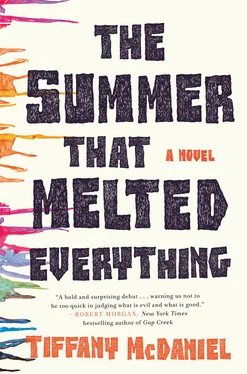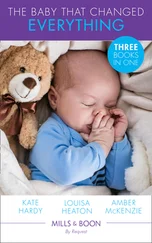“Easy, little man.” Grand put on his team ball cap, lowering its lavender bill. “You’ll raise the hopes so high, I’ll never reach.”
Grand had a vernal face of clean, almost transparent skin, like freshly washed windows. His appearance was his own, but he got there by first taking after Dad. Hair dark brown like a wet branch. Eyes blue like the hill fog. His thick brown brow proved a thoughtful underlining to his forehead, upon which stretched a lone wrinkle, deep for his age.
Something about his eyes made me think of Russia. Perhaps because they were so large, the largest country in the world of his face. Then again, knowing what I know now, maybe it was because his eyes were so like matryoshka dolls, hiding the real him within boxes of lacquered mystery. You’d open one box and find another just the same. No matter how many boxes you took away, there was always one more.
Because I told him his eyes were Russian, he decided to learn the language and would at the most unexpected times drop Russian words in a saline accent Tolstoy would have praised, for an Ohioan at least. It was because of this habit we kept a Russian-to-English dictionary on the coffee table within easy reach.
I often found myself opening that dictionary and trying to learn all that foreign. Mom and Dad didn’t bother with learning it. It was enough for them to be able to look the meaning up quickly, if at all. But for me and Grand, the foreign was something we had an innate desire to learn.
“Kind of young to be the devil, ain’tcha?” Grand smiled at Sal.
Grand was traditionally handsome. His hair was not worn long and loose like mine or his friends’. His was short and tight like that of a father in the 1950s.
I think about the way the world wanted him to be. As classic as a front porch post. Clean direction, straight up and down. But really he was as wild and as twisting as the honeysuckle vines. Bending and exploding in uneven wonders. Moveable and crooked, crossing in awesome curves and beautiful bends.
As far as small town fame goes, my brother was a star. The boy who always did what was expected of him in every aspect of his life. He looked like a heartbreaker, so he broke hearts. He looked like a brain, so he never missed making the honor roll, and he looked like an athlete, so he became the one Breathed pinned its Major League hopes to.
As fate would have it, Grand was born with an arm for pitching with a precise windup and an acceleration and follow-through that everyone said would get him to the Majors.
His forkballs and curves were guaranteed strikes that palsied the batter into a trembling swing. In the games of light rainfall, he would throw a God-given spitter the ump wouldn’t be able to shout illegal on. His cutters might’ve been a swarm of midges, for the bats hit the air more than those pitches, while his four-seam fastballs were always food for the catcher’s mitt.
Grand was the very meaning of his name. I wanted to be just like him. There wasn’t a sport I was really great at, but I could climb. That was why Elohim asked me to join him on his jobs. He’d seen me climbing the tree in front of his house. As I was climbing, one of the branches broke beneath my foot. I was quick and fell only for the second it took to find another branch. I didn’t panic. I merely accepted the fact. That particular branch was gone, and I had to find me another. It was because of this that Elohim said I had the feet of a steeplejack.
“Where you goin’?” Mom gently grabbed Grand’s arm.
“I got baseball practice.” He leaned in for a kiss. “See ya later.”
“In time for dinner?”
“не пропустите это для мира.” He took his smile close to her ear, where he whispered the translation, “Wouldn’t miss it for the world.”
I looked at his shoelaces and their reddish brown staining. He saw me and tipped his ball cap before jumping to the ground from the top porch step. And I smiled, as in love with my older brother as any young boy could be.
“It’s volcano weather ’round here.” Mom slung her head back, trying to toss her long black hair. As usual, the ends were tied up in her apron strings, looking like a tail at her backside. A tail Dad would’ve come up behind and tugged, if he’d been there.
While Grand took after Dad’s brown hair and blue eyes, I took after Mom. Our hair, in its rib-cage shape, fell in a blackness that wisdom calls night. Its winding way was a narrative of the hills, it was the snakes swimming the river, the crow strapped with worms. Dad called it scared hair, the way it curled up into itself at the ends.
This scare would fall to my shoulders then, as it would for the rest of my life, as it does now. Though in youth it was described as swept by the wind, now, in its white and dark gray staying, it is merely disheveled, falling across my shoulders like claws settled in. As is my beard, like a talon on my chest, but I like to think it is my best Walt Whitman.
I tried to count my moles once. The same flat ones she had and which she called chocolate chips. When I was a real small kid, I actually believed the moles were chocolate chips and that if she stood too close to the oven, they’d melt away, so I’d tug on her apron strings and she’d laugh as I led her from the heat.
There was something smeared about our eyes, mine and Mom’s, like contact made with ink before it has had the chance to dry. In my youth, such eyes used to look exotic. Now they’re just something tired.
“So.” Mom lightly clapped her hands once and turned to Sal and me. “Where would you boys like to go first? We can go to Chile, Egypt, Greece, New Zealand. And all in one afternoon.”
She led us into the house, which she had arranged and decorated as invertebrate versions of the nations of the world. Mom herself had never been anyplace but Breathed, so she based her countries on what books told her and what photographs showed her they were like. Because of this they lacked the culture of the traveler and instead held true to that glittered optimism of the one who has yet to travel beyond the picture on the postcard.
She showed Sal room after room, quietly and with only her nylons swishing. The rooms verged on the gaudy, with trinkets, paintings, bright wallpaper done up in the countries’ colors and floras. Fabric was imported. Wood was country specific. The most expensive items were special ordered over the phone, the cheaper charms straight from catalog. She did hire carpenters, painters, artists, any and all who would carve for her the Taj Mahal in our dining room table, Saint Basil’s Cathedral in the fireplace mantel, the Great Wall in the crown molding.
Making a world proved to be expensive, and had there been only Dad’s income, we would have lost more than the respect of the rooms. But Mom was the daughter of the tennis shoe king of Breathed, and after he died she became the sole heir of Breathed Shoe Company, with the factory located just outside town.
“Folks say I shut myself up, never seein’ the world, but I ask ya how can anyone see as much of the world as I see on a daily basis?” She spun in the middle of Spain.
“But they’re not the real places.” Sal’s statement brought her to a sudden stop. “That Machu Picchu in the other room is smaller than a shrub. Don’t you want to see the real places? The real world? Feel the sun on your face as you marvel at the pyramids? Feel the rain while on top of the Eiffel Tower?”
I nudged him with my elbow. “I told ya she’s afraid of the rain.”
Mom dropped to the floor, crossing her lanky legs beneath the billowy skirt of her dress. She propped her elbows up on her knees and held her face with a sigh while the shadows of the room lengthened out toward her, making her one of them.
Читать дальше












